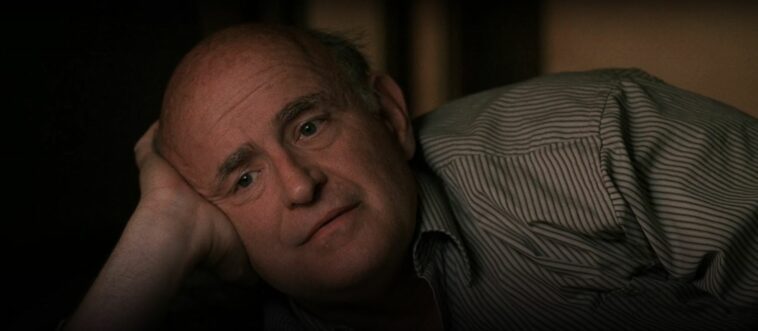Editor’s Note: This piece on The X-Files episode “Clyde Bruckman’s Final Repose” was written during the 2023 WGA and SAG-AFTRA strikes. Without the labor of the writers and actors currently on strike, the series being covered here wouldn’t exist.
Given that it’s an episode of The X-Files, one of the most striking things about “Clyde Bruckman’s Final Repose” is the lack of ambiguity it presents with regard to Bruckman’s (Peter Boyle) psychic abilities. Throughout the episode, he shows himself to know things about people’s deaths with a specificity that would be hard, if not impossible, to explain otherwise. And indeed, by the end of the hour it’s strongly implied that even Scully (Gillian Anderson) has come to view him as legit.
Unfortunately for Bruckman, his power to predict the future seems to be limited to death. He can’t win the lottery, for example, and doesn’t know why he keeps playing. And he views the future as immutable to where it doesn’t make sense to him to try to use his abilities to prevent murders. He doesn’t believe he can. The fact that he helps Mulder (David Duchovny) and Scully anyway would seem to boil down more to him knowing that he’s going to help them than to anything he conceives of as a free choice.
Clyde Bruckman is a sad figure, resigned to both his own fate and that of others, but there is ambiguity in “Clyde Bruckman’s Final Repose” as to whether he’s right about that.
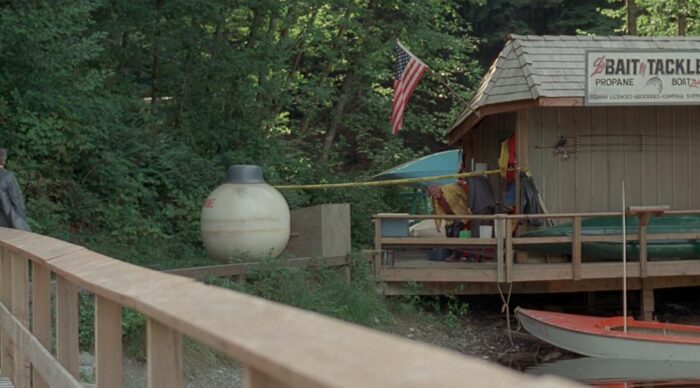
This is where I’d locate the twist that Darin Morgan puts on the X-Files formula with this episode. It’s clear that both Bruckman and the murderer our friends are chasing (Stuart Charno, credited as The Puppet) can see the future, and both are resigned to it. The Puppet has premonitions of himself committing murder and wonders why he’ll do such terrible things, in contrast to Bruckman, who’s an incredibly kind fellow, but neither thinks they can change what’s going to happen.
Yet, when Bruckman prognosticates Mulder’s final showdown with the man (complete with banana cream pie), his vision apparently has The Puppet slitting Mulder’s throat, even if he decides not to relay this detail. This is not what ultimately happens, as Mulder manages to grab hold of his would-be killer’s arm and they struggle, until Scully arrives and shoots The Puppet dead. He laments that this isn’t how it was supposed to go.
The ultimate ambiguity, then, is whether the future is set, or if it can be changed, and if we can change ourselves.
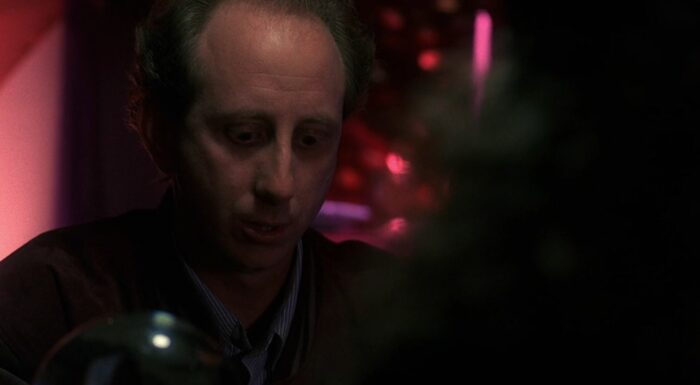
When The Puppet confronts Bruckman in his hotel room with his usual question as to why he’s killing people, Clyde is quite calm in explaining that it’s because he’s a homicidal maniac. It’s one of the funniest moments of the episode, as the man is clearly relieved at finally having an explanation for his actions that really makes a lot of sense.
It doesn’t push him to change his behavior, but of course Bruckman doesn’t think he can do that either. This is what’s going to happen, and that’s just how it is.
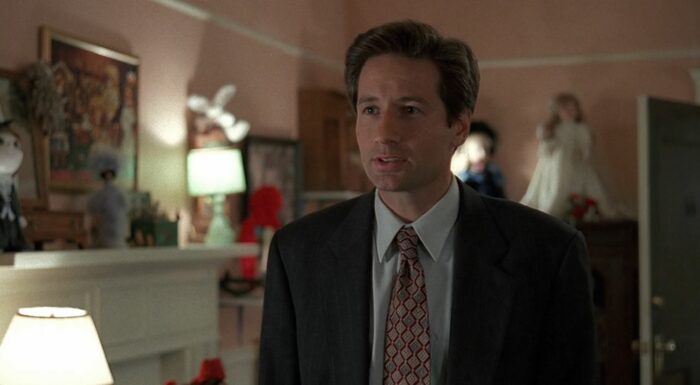
It’s crucial that “Clyde Bruckman’s Final Repose” calls that into question in its climax, without rejecting it entirely. Bruckman’s ennui largely feels justified, as does our own in the real world. At least, you can’t argue against it. You can’t definitively prove that what we do matters—or even that we’re free to decide what to do with ourselves as opposed to being determined entirely by inscrutable forces beyond our control—but you can find openings, cracks in the edifice of determinism that at least present the possibility that life has meaning we can pursue. You can choose to believe it matters.
Clyde Bruckman’s end is sad, because he’s given in, or given up on that possibility. Did he foresee his death, as he had that of others?
He tells Scully, as they sit in a hotel room together earlier in the episode, what their last moment together will be like. He predicts the compassion she’ll be showing him, which she does indeed show, but we can’t ignore the fact that his death is a suicide.
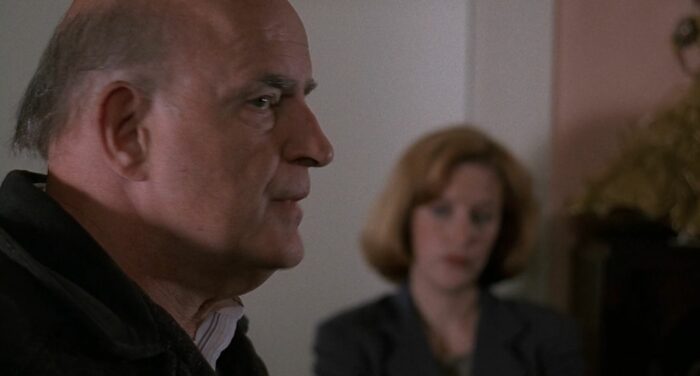
There are other ambiguities with regard to Bruckman’s powers when we ask what role his personality plays in what he says. When he suggests that Mulder will die of auto-erotic asphyxiation, for example, is that a real prediction, or is he just messing with him? We don’t know how Fox Mulder dies.
When Scully asks Clyde how she dies, he says she doesn’t. This could mean that Scully is immortal, or that Bruckman can only see the deaths of people who will die before he does, or that he simply can’t see this one, or that he can see it but he likes Scully and doesn’t want to tell her. There’s really no way of knowing.
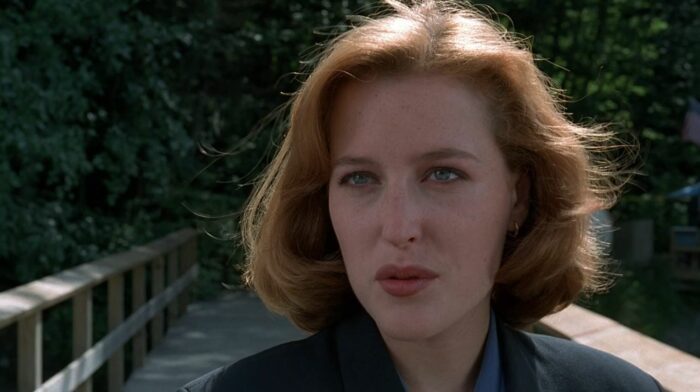
There’s another level of ambiguity that “Clyde Bruckman’s Final Repose” explores throughout its course that I haven’t hit on yet. The Puppet’s victims are purported psychics, who may or may not have had real abilities in this fictional world where at least a couple of people do.
And then there’s The Stupendous Yappi (Jaap Broeker), who has a 900 hotline complete with classic ‘90s late night TV commercial, and whose act at the crime scene at the beginning of the episode is so over the top that Mulder rightly scoffs at it.
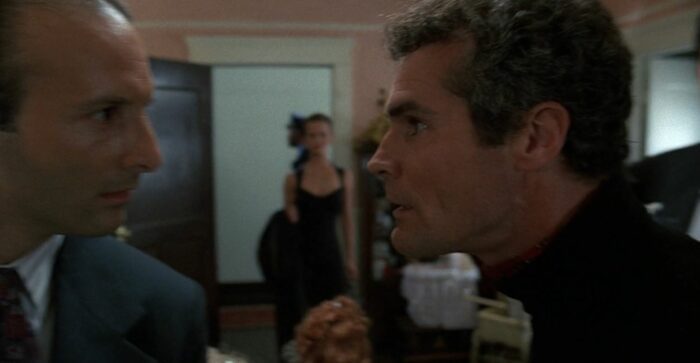
He’s right to note that everything Yappi says is too vague to be legitimately helpful, while at the same time it might feel true in retrospect. This is the traditional structure of confirmation bias that real world fortune tellers play on. Our minds tend to forget those parts of the prediction that didn’t land while remembering and reading into the bits that did, interpreting vague prognostications in light of only evidence that makes them feel true.
In short, “Clyde Bruckman’s Final Repose” presents us with both real psychics and fake ones. The real ones suffer, while a fraud like Yappi prospers. It’s no wonder Scully throws a portable phone at the TV during his ad to close the episode.
It is interesting to note that Jaap Broeker, who portrayed The Stupendous Yappi in this episode, had a long career as an actor, but mostly in very small (and often uncredited) roles or as a stand-in. His role as Yappi vis-à-vis Bruckman has him as something of a stand-in in an inverse way, as he fills the space in public consciousness where psychics would go, but thereby keeps the real ones from being seen.
I don’t know if I’m stretching with that one.
Regardless, “Clyde Bruckman’s Final Repose” is rightly regarded as a standout episode of The X-Files. It’s the second written by Darin Morgan, and I hope you’ll join me again next week as I look at the third: “War of the Coprophages.”
See you next week.

